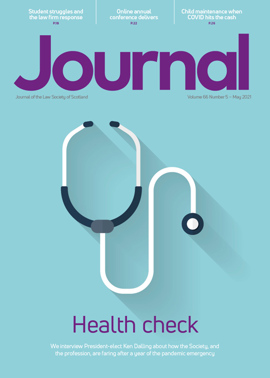Opinion: Julia McPartlin
The Scottish Solicitors Bar Association (SSBA) launched on 7 April 2021. Since then we have had a stream of applications to join. The aim of the SSBA is to represent and promote the interests of criminal defence practitioners across Scotland.
The majority of defence practitioners are engaged in legal aid work. Practitioners have suffered from years of underfunding, resulting in many young people leaving the profession and firms struggling to make ends meet. The steady decline in legal aid funding has been exacerbated by the COVID-19 lockdown and the associated reduction in cases being processed by the courts. The pandemic has also raised concerns such as COVID safety at court and police stations.
I recently finished my two-year term as Edinburgh Bar Association (EBA) President. I could never have envisaged the challenges we would face in the last year. If there is any positive to take from the experience, it is the benefit of increased communication with other practitioners and faculties across the country. During lockdown, an inter-faculty WhatsApp group was set up. It sounds simple, but it was invaluable in providing a quick and easy way to compare what was happening in my own sheriffdom with other areas. This allowed for common problems and potential solutions to be identified.
I also benefited from increased communication with the heads of the Glasgow Bar Association (GBA) and the Aberdeen Bar Association (ABA). This culminated with the EBA, GBA and a number of other faculties agreeing to boycott the St Andrew’s Day holiday custody court in protest at the failure of the Scottish Government to support the profession adequately. The ABA added its voice by publishing an open letter to The Herald in support of our cause. Within a week, a meeting with the Cabinet Secretary for Justice, Humza Yousaf, was organised. Ultimately, the Scottish Government committed to increasing legal aid fees by 10% over two years. I appreciate that the increase is far from enough, but it represents an acknowledgment by those in Government that there is a need for greater funding (compare that with the conclusions of Martyn Evans’ review of legal aid).
The experience of the last year has shown the benefit of closer cooperation between local bar associations. The constitution of the SSBA ensures that there are two representatives from each sheriffdom in Scotland on our executive committee. Those representatives will be nominated by local bar associations. In essence, the SSBA is an umbrella body to facilitate greater communication and cooperation between bar associations. The creation of the SSBA has been funded by donations from local faculties. We hope to bolster the position of individual associations by identifying common areas of concern.
The SSBA acknowledges the hard work and commitment of the Law Society of Scotland (LSS), in particular our President, Amanda Miller, and the Legal Aid Committee negotiating team. We are all fighting for the same cause. Indeed, a number of our executive committee members are also involved in work for the LSS. So why do we need the SSBA as well?
I hope that the SSBA can assist the LSS. Our members are at the coal face; we see what is happening each day at court. We recognise that busy practitioners often find it easier to have a quick chat with their local representative than to make formal complaints. We are uniquely placed to gauge the mood of our members by being present in agents’ rooms across Scotland. It is our hope that we can communicate that experience to the LSS.
Perhaps the most important reason for forming the SSBA is that we are not constrained by regulations in the same way as the LSS. We are able to say and do things that the LSS cannot. The joint action on St Andrew’s Day is a good example of that. It is our hope that the LSS can refer to the formation of the SSBA as an indication of how serious members are about defending the profession. After all, we are stronger when we work together.







